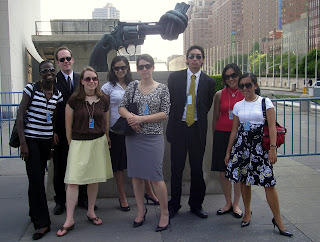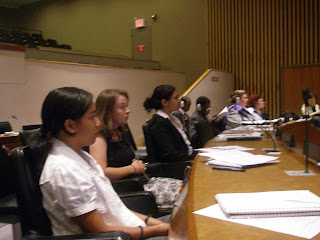 During the weeks of June 30 – July 18 the World Youth Alliance interns attended the Convention for the Elimination of all forms of Discrimination Against Women (CEDAW). Each country that has ratified the treaty is evaluated every four years, and evaluations are held twice per year, in Geneva or New York. This summer, they were at the UN in New York! Excited, we set off each day to hear the experienced and impressive committee of the convention evaluate the performances of the following countries: Yemen, Lithuania, Tanzania, Iceland, Finland, Slovakia, United Kingdon, Northern Ireland and Nigeria.
During the weeks of June 30 – July 18 the World Youth Alliance interns attended the Convention for the Elimination of all forms of Discrimination Against Women (CEDAW). Each country that has ratified the treaty is evaluated every four years, and evaluations are held twice per year, in Geneva or New York. This summer, they were at the UN in New York! Excited, we set off each day to hear the experienced and impressive committee of the convention evaluate the performances of the following countries: Yemen, Lithuania, Tanzania, Iceland, Finland, Slovakia, United Kingdon, Northern Ireland and Nigeria. Soon, however, we discovered a plethora of ideologies and collision of agendas. Women on the Committee often demanded progress of countries, although progress seems to be open to interpretation. One can imagine what kind of progress it would be for a country to be criticized by the Committee for regulating women from working in labour-intensive fields if they are heavily pregnant or over 40. The Committee did, however, focus on real injustices, such as violence against women, maternal mortality rates, education for women, exploitation of women on a societal level (such as the tourist marriages and child marriages in Yemen of rural and poor young girls). One saw a pressing need for CEDAW to speak for the rights and welfare of women especially on these issues.
However, there was an ideological agenda taken on that was also revealing. Cou ntries with high rates of women becoming stay-at-home mothers were harshly rebuked for what are societal patterns evolving in social context rather than the fault of governing bodies. It was almost as if stay-at-home mothers were seen by these fellow women on the Committee to be lesser, to have made the less educated and free choice. And yet it can hardly be argued such, if the numbers choosing to do so are increasing and uncoerced in a democratic society such as Lithuania.
ntries with high rates of women becoming stay-at-home mothers were harshly rebuked for what are societal patterns evolving in social context rather than the fault of governing bodies. It was almost as if stay-at-home mothers were seen by these fellow women on the Committee to be lesser, to have made the less educated and free choice. And yet it can hardly be argued such, if the numbers choosing to do so are increasing and uncoerced in a democratic society such as Lithuania.
Overall, we learned a great deal about diplomacy monitoring those weeks, and the excitement we had anticipating our attendance at the UN was matched only by the experience itself.
Nicole Lau – World Youth Alliance







